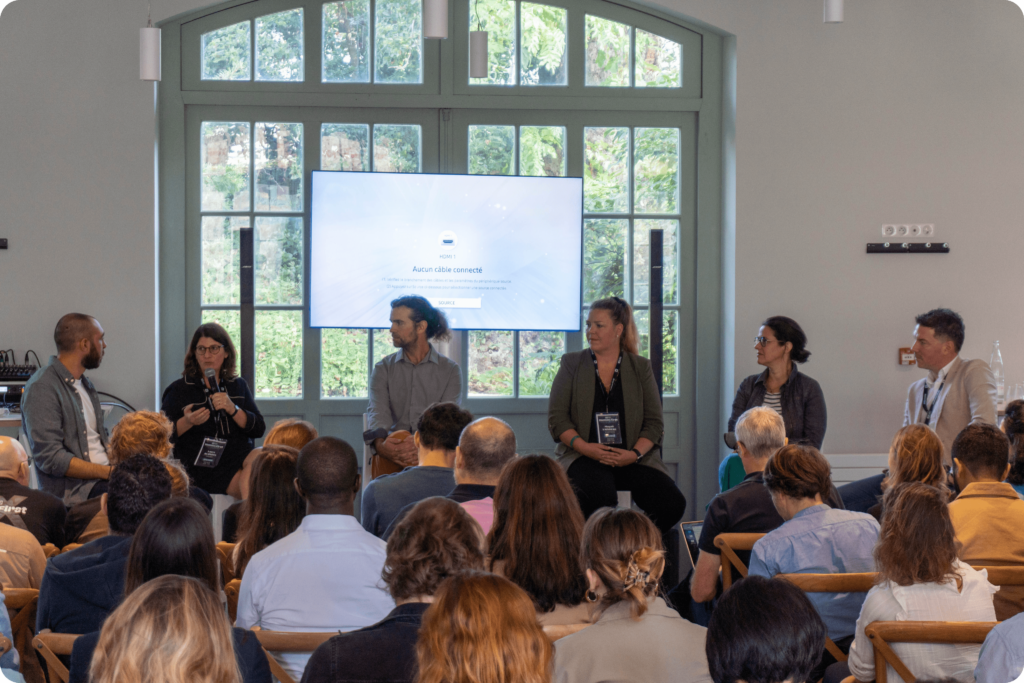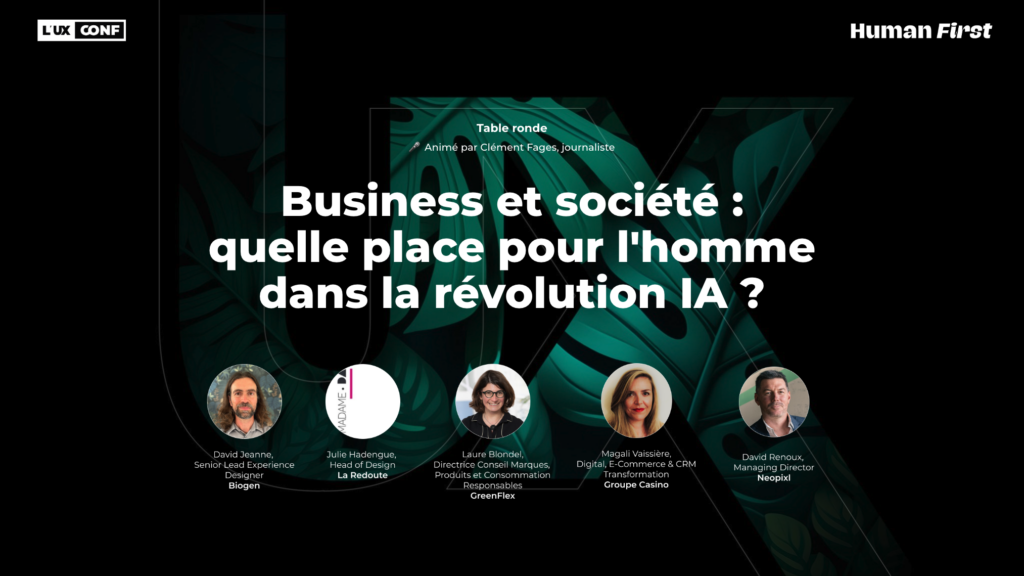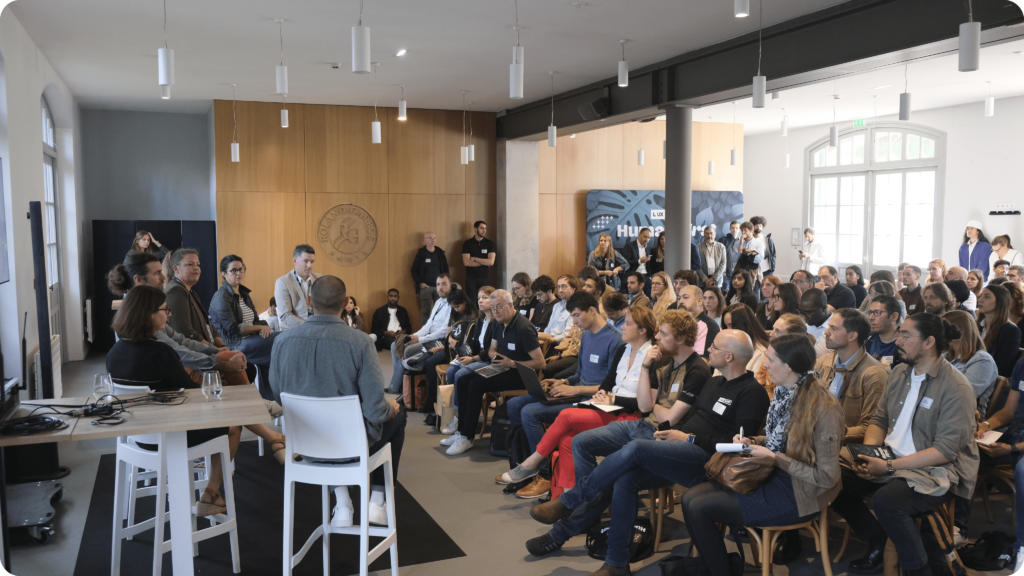This article retraces the round table “Business and society: what place for humans in the AI revolution?”, organized on September 19, 2023 in Paris during the first edition of UX-Conf – Human First. Moderated by Clément Fages, digital journalist, this first round table brought together five speakers:
- David Jeanne, Head Experience Design at Biogen
- Julie Hadengue, Head of Design at La Redoute
- Magali Vaissière, E-commerce marketing and digital director within the Casino Group
- Laure Blondel, Director of Brand, Product and Consumer Consulting Manager at GreenFlex
- David Renoux, Managing Director at neopixl
The themes and issues addressed
- The question of ethics and the impact of AI on companies, consumers, employees
- The question of responsible AI: Clément Fages mentions the article “Why ChatGPT is a environmental bomb” (OBS).
- How can AI be used to optimize our society?
- What are the limits of AI?
AI is presented as the hot topic of the moment and is described as “the future of digital technology which will impact our society”.
The uses of AI in the companies of the speakers
The use of AI at Neopixl
David Renoux explains that he works with AI around mobile apps in the energy and mass distribution sectors: “they are intended for employees but also for distributors”. AI is also used in image processing to find products, for photos and to analyze faces.
The use of visual recognition at La Redoute
Julie Hadengue explains: “At La Redoute, we have the capacity to analyze images and also to say in which category typologies they are found even though they are not necessarily referenced by specific attributes. For example, by taking “bathroom rugs”, the search will obviously be more qualified on bathroom rugs. We also analyze all customer reviews to find the right ones patternsHis It is cited “comfortable sofa”, the word “comfortable” is not necessarily identified, and we will be able to know whether it is a positive or negative opinion. We have also launched a functionality around inspiration: that is to say, we will propose ideas which have been selected automatically.”
The uses of AI at Casino
Magali Vaissière says: “First of all, we use AI to improve the customer experience by offering products and promotions that are much more personalized. Before, we were using relatively human-defined algorithms. Now, we are able to cross-reference buyer profiles and push the best recommendations to the consumer. We have also developed self-learning algorithms which allow us, in the event of a product shortage, to offer customers alternative products”. She specifies that in 90% of cases these are accepted by consumers.
At Biogen: increasing human intelligence through AI
David Jeanne introduces the scope of use of AI in the medical field at Biogen: a scope of use which makes it possible to increase human intelligence thanks to AI. “At Biogen, we work on neurological diseases and AI helps us detect them more quickly, particularly in imaging. For example, today we are able to detect brain lesions with MRIs as effectively as a PET scan which costs much more and is much more invasive for the person. We are also working with AI to offer doctors automatic note-taking. L'AI is able to identify the diagnosis, generate the clinical mode and begin to predict the entire patient journey: cThis is a big step forward for medicine! “
It's Laure Blondel's turn to speak on this subject.
Laure Blondel explains that GreenFlex AI is not yet used. However, she is part of a team studying her potential. She advises companies and organizations to reduce their impact through more responsible choices in their consumption: “As a consulting agency, we work with companies and organizations on sustainable development topics. We study consumer expectations to advise companies and organizations in order to identify their needs in terms of responsible consumption. We have been working in particular on the responsible consumption barometer and with ADEME for almost 20 years. Through our study, we can see that consumers make the link between their consumption and the future of the planet. They make that connection and need help. It is necessary for companies and brands to support them in this dimension. So why not use artificial intelligence to help them?”
In conclusion of this first part
Clément Fages concludes this first part by mentioning a video recommended by David Jeanne: “The Selfish Ledger”, an internal Google video that leaked in 2018: “In summary, the video reveals the potential of AI to evolve towards global decision management to improve the overall functioning of our societies. At the same time, it highlights the ability of AI, at the individual level, to guide us in every choice we make on our mobile devices or in our digital environments. For example, she might suggest: “Have you considered choosing an Uber Pool over an Uber?”
 Photo by Vincent Bernard, Product Owner at UX Republic
Photo by Vincent Bernard, Product Owner at UX Republic
The use of AI: projects and limits
Fighting food waste at Casino using AI
Clément Fages questions Magalie Vaissière about the possibility of using AI to effectively manage early products and thus reduce waste. He emphasizes that this initiative could have a significant impact on all stores, encouraging consumers to adopt more responsible behavior. Clément wonders if these subjects are part of the group's current priorities.
Magalie Vaissière responds: “Indeed, AI plays a crucial role in detecting the maturity of our fruits and vegetables, significantly improving the management of orders, replenishment and stocks. We are currently in the digitalization phase of these processes, taking into account consumer behavior. This aims to encourage healthy choices and a balanced diet, while raising awareness of energy and environmental aspects. The first challenge is to acquire this data, then store and process it in a way that makes it usable by AI, while making it understandable for our employees.”
She illustrates her point with a concrete example at Casino: “In our approach, AI allows us to offer menus respecting the nutri-score, the carbon footprint, while taking into consideration the customers' budget, thus offering an experience joke.”
The “responsible” use of AI at Neopixl
Clément Fages interviews David Renoux from Neopixl on the responsible approach to the use of AI within companies and organizations. David Renoux responds. “AI offers us extraordinary possibilities, bringing a real responsible aspect depending on the objectives we wish to achieve. However, it is essential to ask the following question: is it secure, sovereign and ecological? Building on my support of large companies for six years, the objective is to define an economic model, understand its purpose, and determine how to respect certain principles to ensure the profitability of this use.” He also points out that massive storage of data, photos and videos involves significant energy consumption. So, according to him, the challenge is to find the right model and use technology wisely.
Data management La Redoute
Julie Hadengue highlights some limitations of AI by stating: “AI is entirely data dependent; this raises crucial questions about the evolution of society, the collection, security and use of data”. Many issues emerge, such as where data is placed, how it is stored, who has access to it, the governance of this data, and to what extent we can track the responses generated by an AI. Regarding the “open AI” approach at La Redoute, the decision is categorical: refuse any solution that does not guarantee data security, because exposing customer information on open networks is not possible.”
The limits of AI at Biogen
David Jeanne highlights a major issue: “Although the security of health data is a crucial subject, our main concern lies in reliability. Before an AI-based tool is recognized as a medical device, it is imperative that we are certain of the inner workings of this “black box”. Consistency of diagnoses is crucial: a diagnosis established at a given moment must be identical six months later, with the same data, symptoms and observations. This principle of repeatability and reproducibility is fundamental in the scientific field.”
The notion of responsibility at Greenflex
Laure Blondel from Greenflex highlights the notion of responsibility by declaring: “We frequently talk about the environmental impact, but, in quotes, it is insignificant compared to the impact of the use of AI.” She highlights the growing pressure on planetary resources, noting that a critical limit has recently been crossed. In this context, she emphasizes the need to consume in a more thoughtful and responsible manner, advocating a “less, but better” approach.
Data verification at La Redoute
Julie Hadengue underlines the importance of verification by stating: “We apply a fundamental principle: using several sources. We consider that three different results are needed to convince and confirm or refute a fact reported by AI”. She then illustrates this approach by citing the example of the chatbot, specifying that all responses generated by the AI are scrupulously verified before being transmitted to customers.
Focus on the discussion time with the participants
Question #1: “If it is necessary to go behind the AI to verifying the work, what is the point of that?”
- Julie Hadengue recalls that “we are in an era of transformation where AI is still a black box”. At La Redoute, there is work to guarantee the relevance of AI.
- David Jeanne from Biogen provides clarification on this notion of control before the data is presented to customers: “In my team, in UX, we use AI as an additional colleague. We do not take the AI result as something certain.”
Photo by Anton, Product Designer at UX Republic
Question #2: “Are there things you could help us with? share on “explainable” AI, particularly in the medical domain ? Concerning responsibility, we are starting to hear about the REEN law to make the more responsible companies around data. What is your feeling?”
- David Jeanne from Biogen speaks: “In science, being sure of what you see is an essential part.”
- David Renoux from Neopixl adds about the data used: “When we talk about the use of data, we immediately think of personal data. In reality, I find that AI allows us to reconcile others apart from those of the user: lhe tracking of products, their expiry and many other examples make it possible to process data of a larger volume and to compare them with user data that we already have. AI will exploit them differently and go further in prediction and analysis”.
Question #3: “Regarding the AI mentioned, are they tools that you are developing vor are they external solutions?”
- Julie Hadengue responds: “At La Redoute, depending on the maturity of our research, we either use third-party solutions or we develop our own algorithms internally.”
>> Find other articles from UX-Conf here
Alexa Cuellar, UX Designer at UX-Republic



